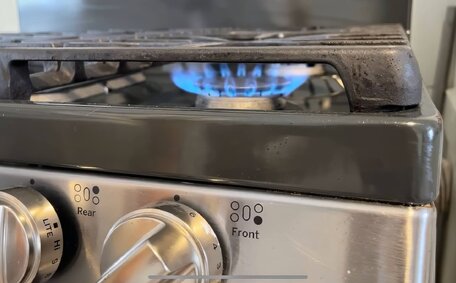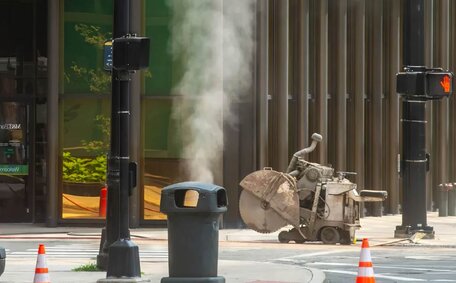Understanding the Environmental Impact of Improperly Disposing Old Gas Appliances
Many people are unaware of the crucial importance of proper disposal of gas appliances, which is essential due to the environmental risks associated with older models that contain ozone-depleting refrigerants and greenhouse gases such as CFCs and HCFCs.
If released into the atmosphere through improper disposal methods, these substances can contribute to climate change and damage the ozone layer which protects us from harmful UV radiation.
Refrigerants in fridges, freezers, and air conditioners made before specific regulations have global warming potentials that can exceed that of carbon dioxide by thousands of times. Allowing these chemicals to escape destroys their ozone depletion potential and enables them to act as incredibly potent greenhouse gases, trapping heat in the atmosphere.
Additionally, many gas appliances contain mercury switches or thermocouples that can release mercury into landfills if crushed. Similarly, asbestos insulation can become a grave health risk if fibres are released into the air. Special care is needed when disposing of old gas cylinders as pressure accumulation in landfills may result in explosions.
Improper disposal of gas appliances poses not only environmental issues but also significant health and safety risks. Harmful materials in appliances such as gas heaters and fridges should be handled appropriately by trained professionals to minimise contamination of land and groundwater supplies. We all have a part to play in keeping our communities safe and sustainable.
Identifying Hazardous Materials in Old Gas Appliances
Numerous household appliances, including fridges, freezers, gas cookers, and hot water heaters, contain materials hazardous to human health and the environment if not managed and discarded properly.
If these substances are released without control into the atmosphere, they can cause significant damage to the ozone layer.
Other concerning materials that may necessitate a chemical cleanout and are considered hazardous waste if your old appliances are not disposed of correctly, include:
Identifying and safely managing appliances with dangerous substances is key to protecting health, preventing pollution, and curbing the release of dangerous greenhouse gases that contribute to climate change. Always seek professional help to safely decommission old gas appliances, ensuring they don’t pose risks like potential cylinder explosions.
Safely Decommissioning Gas Appliances Before Disposal
Follow these crucial steps to safely decommission and remove old gas appliances including cookers, hot water systems, and heaters pre-disposal:
- Firstly, turn off the gas supply. Locate and fully close the shutoff valve to disconnect your appliance from the gas line.
- For electric-powered appliances, ensure they are switched off and unplugged from the power outlet or isolator switch.
- Let appliances cool thoroughly before handling to prevent potential burns from heated surfaces.
- If it contains refrigerant, call a licenced technician to remove gas and ensure the system is degassed correctly. Never puncture cooling lines or vents yourself.
- Carefully remove your gas unit from water and electrical connections. Seal any open vents or pipes.
- If possible, remove doors, lids, and drawers to prevent the risk of trapping children inside.
- Do not place your appliance in general waste; rather, take your gas bottle to a dedicated resource recovery centre that specialises in gas cylinder recycling, often with free pickup services.
- Consider donating functional appliances to charity to recycle your old goods, extending their usable life sustainably.
To ensure the safe disposal of old gas appliances, have problematic cylinder valves professionally assessed and dealt with. When in doubt, seek professional assistance to seek advice to avoid hazards from leaks, explosions to dangerous materials. With some simple precautions, we can rid old gas units responsibly.
Locating Licensed Technicians to Assist with Decommissioning
Decommissioning gas appliances necessitates the expertise of qualified professionals, especially when dealing with hazardous materials or pressurised systems to reduce associated risks.
In Australia, technicians working on gas systems must have a gasfitting licence, as stipulated by the Plumbing Industry Commission. A valid licence ensures proficiency in the following areas:
- Expert handling of pressurised gas systems
- Safely decommissioning and degassing refrigerant systems
- Appropriate procedures for purging, disconnecting, and sealing gas pipes
- Identifying and containing hazardous materials like asbestos
- Compliance with gas safety regulations and environmental codes of practise
Engaging a technician whose gasfitting licence is current ensures the requisite certification and competence for proper system decommissioning. Licenced technicians can help with training in shut-off protocols, hazard containment and responsible disposal methods.
As experts in lpg cylinders and natural gas systems, we hold all required licences and industry certifications. For safe appliance decommissioning in the Rockdale area, contact us directly. Get your inspection scheduled with us to professionally degas or remove old gas appliances, ensuring the process to dispose old units is seamless.
Finding Local Recycling and Disposal Options
Residents in the Rockdale area have access to several local, sustainable options for responsibly disposing of old gas appliances.
The Rockdale City Council provides a free household clean-up service to facilitate the safe disposal and recycling of items, including old fridges, stoves, and hot water systems. Up to six items, which could include fridges, washing machines, or other household items, can be scheduled for pick up kerbside each financial year. Council also accepts white goods, include old appliances like your barbecue and gas heaters at its permitted waste facility for a small fee.
Several metal recycling facilities in our region offer cash in exchange for scrap metal items like ovens, old gas cylinders and gas cookers. Cylinder recycling properly captures valuable metal plastic materials, along with steel, while keeping hazardous pressurised tanks out of landfills. Consult local listings to find waste dropoff locations for disposing of unwanted old gas appliances.
Some retailers run trade-in deals allowing you to dispose of your old gas appliance when you purchase a replacement. This funds proper recycling while saving you money on your own new purchase.
Not-for-profit organisations like the Smith Family, Vinnies and Lifeline also collect functional second-hand gas appliances for those who need them, like fridges, washing machines for resale at affordable prices in their stores, thereby avoiding landfill.
As your local licenced gas fitters, we can get your old gas systems safely decommissioned and legally disposed of too. Contact us for help responsibly removing and recycling gas appliances of all kinds.
Donating or Selling Still-Functioning Appliances
If your gas appliances like stoves, ovens or hot water systems are functioning, they still may be suitable for donating to charity organisations instead of discarding them. Many groups like the Smith Family, Vinnies, Lifeline or local community centres accept donations of good working appliances to sell in their stores.
This gives pre-loved items a new life rather than sending them to landfill.
Alternatively, you can sell your vehicle and other items, including fully functional small appliances, through classified ads or community noticeboards.
Clearly advertise your items and discover more about their full potential by detailing the model, dimensions, features and current condition. Price items fairly based on age and demand. Consider offering a warranty to assure buyers of quality and safety.
Donating or selling usable appliances reduces waste while benefitting others needing affordable options. Just ensure all units are safe and lawful to operate before passing them on. Have a licenced technician at your service for items if unsure.
Understanding Regulations for Gas Appliance Disposal
When disposing of gas bottles in New South Wales, there are important regulations to follow for legal compliance and environmental sustainability.
Under the Protection of the Environment Operations Act 1997, it is illegal to dispose gas cylinders in household rubbish bins. Gas bottles must disposed at approved collection centres for safe defusing and recycling instead. There are significant fines for improper disposal.
Fridges, freezers and air conditioner units containing refrigerants like CFCs need controlled degassing by qualified technicians before recycling, as these hazardous emissions occur when releasing ozone-depleting substances. As a licensed gasfitter team, we adhere to Planet Ark endorsed decommissioning procedures.
Many councils like Rockdale City provide household waste collection services to gather other appliances like stoves, ovens and hot water systems for responsible recycling. Alternatively, most landfills and transfer stations accept white goods like old fridges and washing machines for small fees.
When selecting disposal methods, check they align with EPA guidelines and local laws. As community members, we all share responsibility for reducing various types waste types of waste and protecting our shared environment sustainably while following proper procedures.
Adopting Sustainable Practices to Reduce Waste
There exist multiple sustainable practices to adopt with gas appliances, aiming to reduce waste and minimise environmental impact.
Opting for more gas-efficient models, including dryers air systems, uses less energy over time, requiring more gas but cutting emissions. Modern appliances also often have improved safety features, which means longer lifespans when properly maintained.
Basic maintenance can significantly extend the lifespan of your gas appliances. Keep air vents clear, regularly service water heaters, and keep cooktops and griller plates clean. Replace seals and hoses as needed to prevent gas leaks or damage.
Our maintenance services are designed to help extend the lifespan of your gas appliances. Our licensed technicians can address minor issues efficiently, preventing the need for premature disposal.
When your device or appliance does reach its end-of-life, no longer being efficient or safe to use, we ensure to have old units disposed safely under approved recycling procedures. Old units get degassed correctly and valuable materials recovered rather than entering landfills.
Through effective resource management, embracing the principles of sustainability, choosing gas appliances wisely, maintaining them regularly, and disposing of them responsibly, we contribute to waste reduction and diminished environmental impact for future generations.






